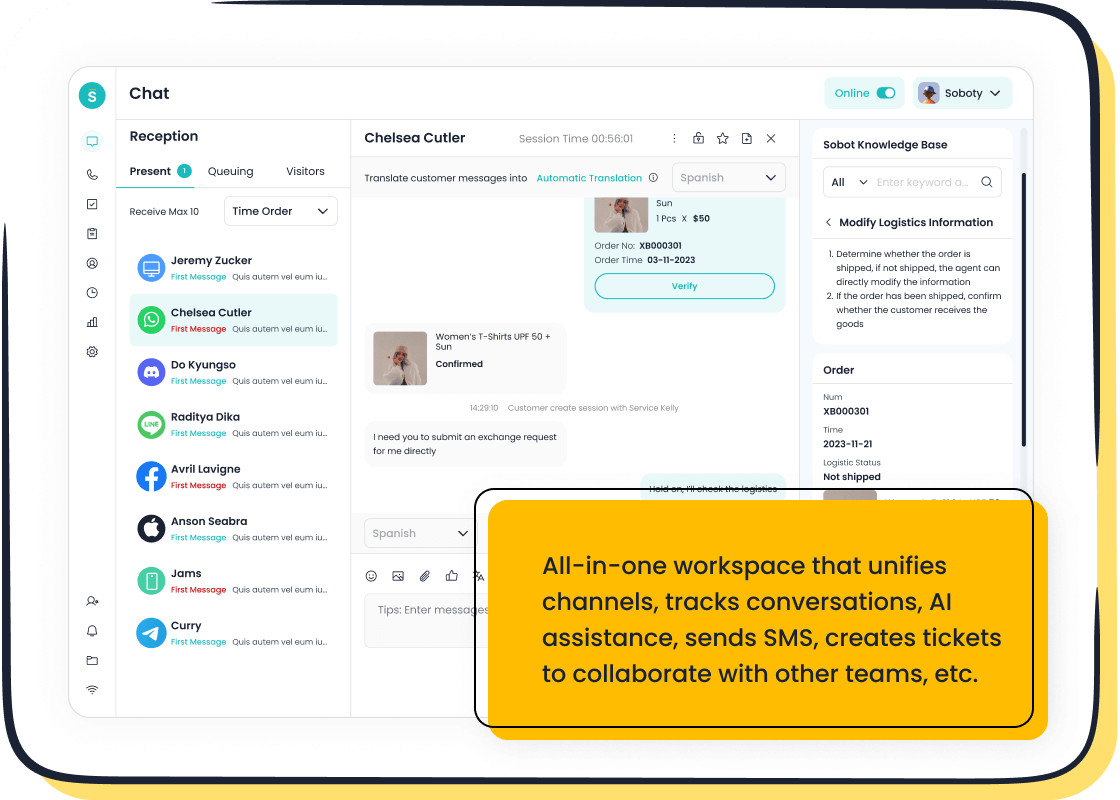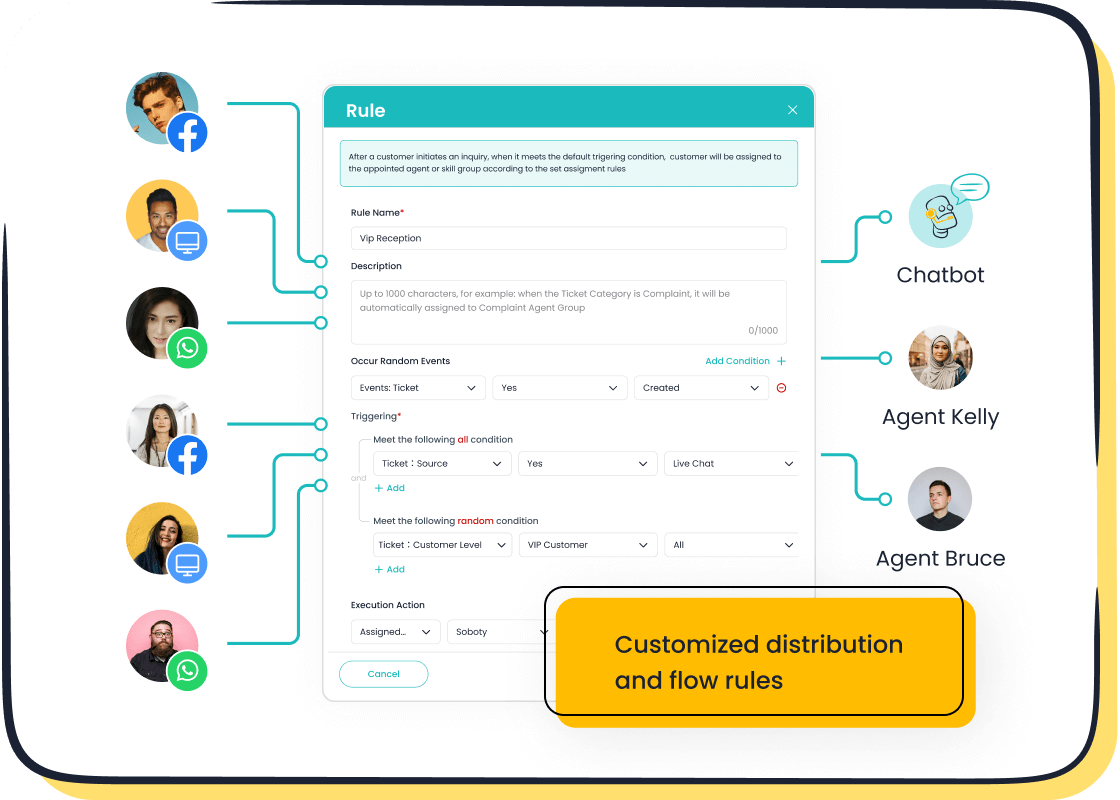Live Chat vs Chatbots Don't Choose Until You Read This

You face the tough live chat vs chatbots decision. The best choice is not one or the other. You need a hybrid solution for a superior customer experience. A great chatbot provides instant answers, while live chat offers a human touch. Your customer wants the speed of a chatbot and the empathy of live chat. This blended experience works.
Consider what your customer wants:
- 60% would use a chatbot over waiting 15+ minutes for an agent.
- 20% of Gen Z prefer starting with a chatbot and escalating to live chat if needed.
A powerful chatbot from Sobot AI and a responsive live chat from the Sobot call center create the ideal solution. Sobot helps you combine these chatbots and live chat tools to avoid a costly wrong decision.
When to Use a Chatbot for 24/7 Support
A chatbot is your tireless front-line agent. You can deploy a chatbot to handle specific tasks efficiently. This frees up your live chat team for more complex customer needs. A well-implemented chatbot solution can resolve between 70% and 90% of common issues without human help. Let's explore the best times to use chatbots.
Instant, Repetitive Queries
Your customers want answers now. They do not want to wait for a live chat agent for simple questions. An AI chatbot excels at providing instant responses to frequently asked questions. You can use a solution like Sobot's AI solution to automate tasks like order tracking, appointment scheduling, and policy questions. This gives your customer a 24/7 self-service option. The chatbot provides consistent and accurate information every time, improving the customer experience.
Lead Qualification and Data Collection
A chatbot can be a powerful tool for your sales team. It works around the clock to capture and qualify leads. The chatbot asks targeted questions to gather key information.
Example Lead-Qualifying Questions:
- "What is your primary goal for using our service?" (Uncovers Need)
- "How many people are on your team?" (Uncovers Company Size)
- "Are you working with a specific budget?" (Uncovers Budget)
By asking these questions, the chatbot identifies high-quality leads. It then passes the complete conversation context to your live chat sales agents. This process ensures your team only talks to prospects who are ready to buy. These automated chatbots help you boost sales and gather valuable customer data.
Cost-Effective After-Hours Service
You want to support every customer, even outside of business hours. Hiring a 24/7 live chat team is expensive. A chatbot offers a cost-effective alternative. It provides round-the-clock support without the high cost of human staffing. This AI solution ensures no customer question goes unanswered. Using chatbots for after-hours support reduces operational costs. It also allows your business to serve a global customer base across different time zones.
When to Use Live Chat for the Human Touch

While a chatbot handles volume, live chat delivers value through human connection. Your live chat agents are essential for situations where empathy, persuasion, and complex problem-solving are required. Using live chat for these key moments builds trust and drives revenue. Let's look at when you should use live chat.
Complex or High-Stakes Issues
A chatbot can answer common questions, but it cannot handle every problem. You need a human agent for difficult or sensitive situations. Your live chat team excels at managing frustrated customers or issues the system has not seen before.
"Human agents are for the exceptions—customer problems the system has not encountered before, or frustrated customers that demand empathy." — P.V. Kannan and Josh Bernoff, The Future of Customer Service Is AI-Human Collaboration
Your agents can ask creative questions to find the root cause of a problem. They can then create custom solutions for unusual issues. This level of adaptive customer service turns a negative situation into a positive experience. A live chat agent takes control and synthesizes a solution for the customer.
Closing Sales and Upselling
Human interaction is powerful when closing a sale. A live chat agent can build rapport with a customer in a way chatbots cannot. This personal touch makes a big difference. In fact, website visitors who use live chat are 2.8 times more likely to convert.

Your agents can use a platform like Sobot Live Chat to turn conversations into revenue. They can answer detailed product questions and overcome objections. This leads to significant results, including a 38% gain in conversion. Your live chat team can also increase order value by:
- Upselling: Suggesting a premium version of a product.
- Cross-selling: Recommending a complementary item.
- Offering Promotions: Providing an exclusive discount to encourage an immediate purchase.
VIP Customer Service
You want to give your most valuable clients a premium experience. A great strategy is to route high-value customers directly to your best live chat agents. This bypasses the chatbot and provides an immediate, high-touch connection. This VIP treatment shows your top customers you value their business. It builds strong loyalty that keeps them coming back. This is a key part of a smart customer service strategy that chatbots alone cannot provide.
The Hybrid Model: How Sobot Combines Chatbots and Live Chat

You do not need to choose between live chat and chatbots. The most effective strategy combines the strengths of both. A hybrid model uses a chatbot as the first line of defense and seamlessly escalates complex issues to a live chat agent. An all-in-one platform like Sobot makes this powerful human-machine cooperation a reality. You get efficiency and a superior customer experience in one unified solution.
Chatbot as the First Contact
You can design your chatbot to be the first point of contact for every customer interaction. This approach is highly effective. Studies show that approximately 80% of customers report positive experiences with AI-powered service, valuing the rapid responses. A chatbot immediately engages visitors, answers common questions, and gathers initial information.
To make this first interaction successful, you should design a helpful conversational flow.
- Guide Users: Use buttons and quick replies for fixed actions like "Track My Order." This reduces typing and speeds up the process.
- Set the Pace: Break down long messages into smaller chunks. Use short pauses to make the chatbot interaction feel more like a natural conversation.
- Plan for Fallbacks: Create helpful messages for when the chatbot does not understand a query. You can suggest rephrasing or offer a menu of common options.
Using a chatbot first allows you to serve more people instantly. It also qualifies issues before they reach your live chat team, making everyone more efficient.
Seamless Chatbot to Live Agent Handoff
The most critical part of a hybrid model is the handoff from the chatbot to a live chat agent. A poor transfer forces your customer to repeat information, causing frustration. A smooth handoff makes the customer feel supported. You need a system that preserves the full conversation history. When the live chat agent takes over, they should see everything the chatbot already discussed.
Best practices for a seamless handoff include:
- Automatic Triggers: Set up rules to automatically transfer a conversation to live chat. You can use keywords like "complaint" or "refund" to trigger an escalation. Sentiment analysis can also detect customer frustration and initiate a handoff.
- Smart Routing: Route the customer to the right department. A billing question should go to the finance team, while a technical issue goes to a support specialist.
- Context Preservation: Ensure the live chat agent receives the full chat transcript. This is the most important step. It prevents the customer from having to start over.
This human-machine cooperation delivers incredible results. For example, smart device leader OPPO used Sobot's hybrid model to achieve an 83% chatbot resolution rate and a 94% positive feedback rate. This shows how a well-executed handoff improves both efficiency and customer satisfaction. Many top companies use this model to great effect.
| Company | AI Tool/Approach | Key Outcomes (Human-Machine Cooperation) |
|---|---|---|
| Motel Rocks | Advanced AI chatbots with mood sensing | 43% of tickets were deflected by the chatbot, and agents focused on complex queries. |
| Camping World | Cognitive AI tool "Arvee" | Arvee handles 24/7 calls and provides warm hand-offs, increasing agent efficiency by 33%. |
| Telstra | Azure OpenAI service "Ask Telstra" | The AI summarizes customer history, making 90% of agents more effective in their roles. |
A unified platform like Sobot provides the technology to manage these seamless handoffs, creating a better experience for both your agents and your customer.
Data Analysis for Optimization
A hybrid model generates a huge amount of valuable data. You can use this data to continuously improve your chatbot, train your live chat agents, and refine your overall customer service process. An integrated platform gives you a single place to analyze interactions from both chatbots and live chat.
You should track key metrics to understand performance. An analytics dashboard can help you monitor these numbers.
| Feature | Function | Benefit |
|---|---|---|
| Natural Language Processing (NLP) | Interprets user intent and sentiment. | Helps the chatbot deliver more human-like responses and identify when to escalate to live chat. |
| Machine Learning Capabilities | The AI learns from past interactions. | Ensures your chatbot gets smarter over time, reducing the need for manual script updates. |
| Analytics and Monitoring | Tracks metrics like resolution time and escalation rates. | Offers clear insights for making data-driven improvements to your support strategy. |
By analyzing conversation transcripts, you can identify common questions that your chatbot is failing to answer. You can then update the chatbot scripts to handle these queries in the future. This process of collecting, analyzing, and integrating insights allows your AI to adapt to evolving customer needs. This data also reveals areas where your live chat agents may need more training. This cycle of optimization ensures your hybrid system becomes more effective and efficient over time.
A 3-Step Framework for Your Chatbot vs Live Chat Decision
You now understand the unique strengths of a chatbot and live chat. The final step is to build a strategy that fits your business. This simple three-step framework will help you navigate the live chat vs chatbots decision. You can create a customer support plan that is both efficient and effective.
1. Assess Customer Needs
You must first understand what your customers are asking for. Analyzing your current support tickets is the best way to start. Your goal is to find the ratio of simple, repetitive questions to complex, unique problems.
You can categorize your support tickets in a few ways:
- Use Tags and Custom Fields: Create tags like
simpleorcomplexfor each ticket. This allows you to track and analyze the distribution of different query types over time. - Measure Agent Touches: Count the number of responses an agent sends for each ticket. A high number of touches often means the issue was complex and required more effort.
- Track Escalation Rate: Note how many inquiries get passed to a higher support tier. A high escalation rate points to complex issues that your first line of support cannot solve.
Once you have this data, you can see which needs are best for a chatbot and which require live chat.
| Customer Need Category | Best Suited for Chatbot Automation | Best Suited for Live Agent Support |
|---|---|---|
| Complexity | Simple, repetitive questions (e.g., order status, store hours, password resets). | Complex or unique issues requiring creative problem-solving (e.g., billing errors, custom order changes). |
| Volume & Availability | High-volume inquiries that need 24/7 responses. | Lower-volume situations that need personalized attention. |
| Emotional & Sensitivity | Factual, non-emotional queries. | Sensitive situations that require empathy (e.g., handling an upset customer, discussing financial matters). |
| Interaction Type | Quick, instant answers. | Personalized support, building relationships, and negotiation. |
This analysis gives you a clear picture of your customer support landscape. It helps you decide where a chatbot can have the biggest impact.
2. Evaluate Budget and Resources
Your budget plays a major role in the chatbot vs live chat decision. You need to compare the costs of chatbot software against the expense of hiring more live chat agents. A chatbot often has a higher initial setup cost but lower long-term operational expenses.
Did you know? The annual fully loaded cost of one human support agent can exceed $110,000. In contrast, an AI chatbot operates on a predictable and low monthly software fee.
When budgeting for a chatbot, you should consider several cost components:
- Core Functionality: This includes the conversational AI, integrations with your CRM, and omnichannel messaging capabilities.
- Technology and Integration: Costs can increase if you need to connect the chatbot to outdated internal tools or complex systems.
- Data Protection: Investing in a secure chatbot is critical, especially in regulated industries like finance or healthcare where data breach fines are high.
- Maintenance and Support: You should allocate about 15-20% of the initial project budget annually for regular updates, security patches, and performance monitoring.
A chatbot offers a strong return on investment by lowering operating costs and handling a high volume of interactions. A live chat team drives ROI by increasing customer satisfaction and building brand loyalty. Your budget evaluation should weigh the upfront investment of a chatbot against the recurring salary costs of a live chat team.
3. Define Your Primary Goal
Your primary goal will shape your customer support strategy. Are you focused on cutting costs, improving the customer experience, or both? Your answer will help you choose the right starting point. You can use a simple decision tree to guide your choice.
If your primary goal is...
-
Maximum Efficiency and Cost Reduction:
- Your Strategy: Start with a chatbot-first model.
- How it Works: You can use a chatbot to handle the majority of incoming queries. This approach aims for a high deflection rate, where the chatbot resolves issues without human help. You can achieve deflection rates between 30% and 60% with a strong chatbot and knowledge base. The live chat team then handles only the most complex escalations.
-
A Premium Customer Experience:
- Your Strategy: Start with a live chat-first model.
- How it Works: You can route all inquiries directly to your live chat agents. This ensures every customer receives a personal, human touch. This is ideal for luxury brands or businesses that handle sensitive issues. A chatbot can assist in the background by providing agents with information or handling data entry.
-
A Balance of Efficiency and Experience:
- Your Strategy: Implement a hybrid model from the start.
- How it Works: This is the most powerful approach. The chatbot acts as the first point of contact to provide instant answers. It then offers a seamless handoff to a live chat agent for complex problems. This model, which combines rule-based logic with AI flexibility, gives your customer the best of both worlds: speed and empathy.
Important Note: Even when focusing on cost, you must monitor customer satisfaction. A bad chatbot experience can be damaging, as 68% of consumers say they would not use a chatbot again after a negative interaction. Always provide a clear path to a live chat agent.
This framework helps you make an informed decision. It ensures your choice aligns with your customer needs, budget, and business goals.
You should no longer think in terms of live chat vs chatbots. The best customer service strategy uses both a chatbot and live chat. A hybrid model, powered by a unified platform like Sobot, gives your customer a great experience. This approach combines the instant support of a chatbot with the personal touch of live chat. You get efficiency and a superior customer experience. Your customer service team can use a chatbot and live chat to improve every interaction. The live chat vs chatbots choice is simple: you need a chatbot and live chat.
Ready to embark on your contact journey? Start by identifying your top 5 repetitive customer questions and see how a Sobot chatbot can automate the answers. Explore our free trial today.
FAQ
How do I measure the success of my chatbot and live chat?
You can track key customer satisfaction metrics. For your chatbot, you can measure the resolution rate. For your live chat, you can use post-chat surveys. This data helps you improve your overall customer service. A good live chat software and chatbot solution will provide these analytics for your live chat.
Can a chatbot offer personalization like live chat?
A chatbot offers some personalization by using a customer's name and order history. However, true personalization and personalized assistance come from live chat. Your live chat agents use empathy and context to build rapport. This level of customer engagement is unique to live chat. A chatbot cannot fully replicate this live chat experience.
What is the best way to start with a chatbot and live chat solution?
You should start by analyzing your customer support needs. A hybrid solution is often best. Use a chatbot for simple questions. Use live chat for complex issues. This approach improves customer engagement. Your live chat software and chatbot should work together. This makes your customer service and customer support more effective.
How does live chat software improve customer engagement?
Live chat software boosts customer engagement by providing instant, one-on-one conversations. This direct interaction builds trust. Your live chat agents can offer personalized assistance. This makes customers feel valued. Good live chat solutions and customer service software enhance this live chat connection. This live chat experience is key for your live chat.
Why is a hybrid chatbot and live chat model so effective for customer support?
A hybrid model combines the speed of a chatbot with the empathy of live chat. The chatbot handles common questions 24/7. Your live chat agents solve complex problems. This customer support strategy improves efficiency and satisfaction. This live chat and chatbot solution offers a complete live chat and customer service experience.
See Also
Selecting the Ideal Chatbot Software: A Comprehensive Buyer's Guide
Picking Top Chat Software for 2024: An Essential Selection Guide
Comparing Leading Live Chat Solutions: Your 2024 Feature Breakdown
Achieving Excellence in Customer Support Through Live Chat Mastery
The Ultimate Guide to Finding Your Perfect Live Chat Software
